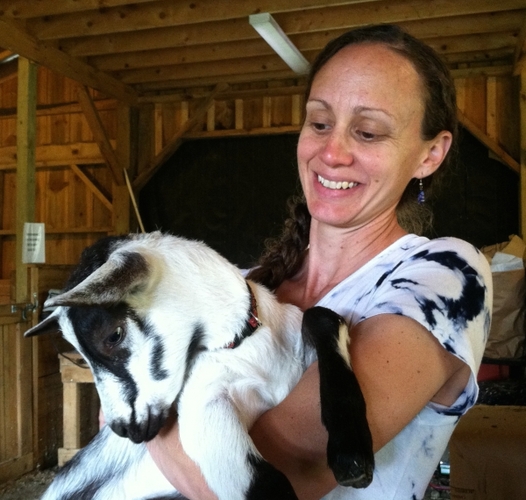WESTMINSTER — As you near the end of a steep dirt road just off Route 121, one of those inexplicable Vermont hillside farms appears, almost defying the laws of gravity.
But for a handsome older horse named Chesapeake, five barnyard ducks, two dogs, a drove of pigs, 30 rambunctious goats, and the Ware family, AlpineGlo Farm is a comfortable home.
“We have 22 acres here, and most is mountainous hillside, which goats love,” said Rachel Ware, AlpineGlo's proprietor, goatherd, and cheesemaker.
Goats don't like fields so much, she explained. When put in a field, goats will find the borders, because “goats want to eat the bushes,” she said.
This is Ware's first year of selling cheese to the public. Making cheese from goats' milk was an easy choice for her.
“I just love goats so much,” she said.
From the time she was a teenager, Ware always had a handful of pet goats, usually as companions for her horse.
“I couldn't have more than one horse,” because of space constraints, she said - but, a horse should not be lonely. Goats are good friends to horses, she explained.
Ware is convinced Chesapeake “thinks he's a goat now” from spending so much time with the herd.
When she and her family moved to Clark Street about 15 years ago, she asked herself, “How can I have more goats?”
Ware wanted to progress beyond merely having goats as pets, or as a companion to Chesapeake; she wanted enough animals to provide milk for her family.
She said she bought three Alpine goats, “but the next thing you know ... In the classic goat farmer story, it evolved.”
More goats, more cheese
Finding herself with more milk than her family could use from the three goats she began with, Ware decided cheesemaking was the solution. It also justified getting more goats.
Going from milking three goats to making cheese took a while, she said, mostly because Ware is an inveterate do-it-yourselfer.
Pointing to her milking parlor and cheesemaking room, Ware said, “I built those myself, slowly. I didn't want to get into debt,” noting she could have paid someone else to build the structures, but it would have cost her so much more.
Plus, she said, what could beat “the self-satisfaction of building something yourself?”
The barn where the baby goats live? Ware built that, too.
“These women foresters came here” and cleared some of Ware's trees and milled the lumber on-site, “so my barn is built with my own wood. Women loggers! Woo hoo!”
Similarly, Ware learned cheesemaking mostly on her own.
“Like everything else I do, I just figured it out,” she said. She took a few one-day classes and read books, she said.
After making cheese for home use for the last five years, this past year Ware established AlpineGlo as a business and got her production certified by the U.S. Department of Agriculture. This spring, she began selling her cheeses at the Ludlow and West River farmers' markets, and from a little stand next to her house. She hopes to get her product into local stores soon, too.
All of AlpineGlo's cheeses are farmstead - produced on the farm where the animals are milked - and are made of pasteurized milk. This is to keep the farm in compliance with the FDA's regulations that all cheeses aged fewer than 60 days be pasteurized.
In addition to what Ware calls ”the classic plain chèvre” - fresh, smooth, spreadable goat cheese - she also makes cranberry-walnut chèvre, and plain and garlic-dill neufchâtel, a smoother version of chèvre.
AlpineGlo also makes a Bulgarian-style feta, aged five days and not brined, because, Ware said, ”I don't like it so salty.” Ware marinates it in olive oil, sun-dried tomatoes, and herbs.
Goats: The new chickens
For those looking to venture into the world of goats, Ware noted those with smaller parcels of land can easily have a pet goat or two, much as many urban and suburban dwellers have brought chickens into their yards.
“Chickens are step one,” for micro-sized animal husbandry, she said, adding, “goats are the next step.”
Goats are easy to take care of, Ware said, noting they are economical and efficient in relation to how much care and feed - beyond browsing - they require.
“If you have enough land for goats, it affects their supplemental feed,” she said.
AlpineGlo has 30 Alpine breed goats, but Ware currently milks only 11 of them to produce about 40-50 pounds of cheese a week, “because they're that efficient.”
